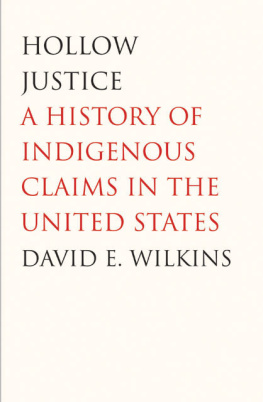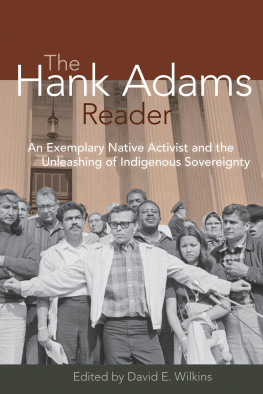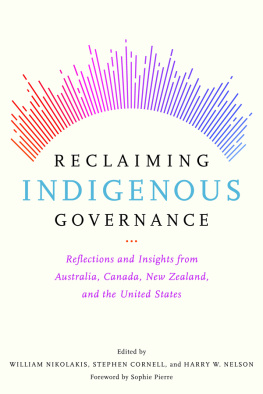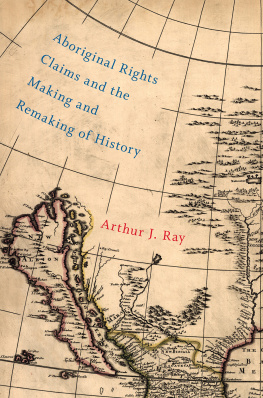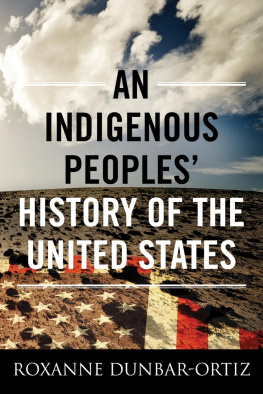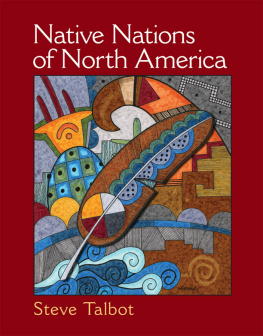
The Henry Roe Cloud Series on American Indians and Modernity
SERIES EDITORS : Ned Blackhawk, Professor of History and American Studies, Yale University, and Kate W. Shanley, Native American Studies, University of Montana
SERIES MISSION STATEMENT
Named in honor of the pioneering Winnebago educational reformer and first known American Indian graduate of Yale College, Henry Roe Cloud (Class of 1910), this series showcases emergent and leading scholarship in the field of American Indian Studies. The series draws upon multiple disciplinary perspectives and organizes them around the place of Native Americans within the development of American and European modernity, emphasizing the shared, relational ties between indigenous and Euro-American societies. It seeks to broaden current historic, literary, and cultural approaches to American Studies by foregrounding the fraught but generative sites of inquiry provided by the study of indigenous communities.

Published with assistance from the foundation established in memory of James Wesley Cooper of the Class of 1865, Yale College.
Copyright 2013 by Yale University.
All rights reserved.
This book may not be reproduced, in whole or in part, including illustrations, in any form (beyond that copying permitted by Sections 107 and 108 of the U.S. Copyright Law and except by reviewers for the public press), without written permission from the publishers.
Yale University Press books may be purchased in quantity for educational, business, or promotional use. For information, please e-mail sales.press@yale.edu (U.S. office) or sales@yaleup.co.uk (U.K. office).
Set in Electra type by IDS Infotech Ltd., Chandigarh, India.
Printed in the United States of America.
Library of Congress Cataloging-in-Publication Data
Wilkins, David E. (David Eugene), 1954
Hollow justice : a history of Indigenous claims in the United States / David E. Wilkins.
pages cm. (The Henry Roe Cloud series on American Indians and modernity)
Includes bibliographical references and index.
ISBN 978-0-300-11926-8 (hardback)
1. Indians of North AmericaClaims. I. Title.
KF8205.W528 2013
346.730432dc23
2013013904
A catalogue record for this book is available from the British Library.
This paper meets the requirements of ANSI/NISO Z39.481992 (Permanence of Paper).
10 9 8 7 6 5 4 3 2 1
I RESPECTFULLY DEDICATE this book to my dear friend Daniel (Danny) Bell, Jr., a citizen of the Coharie people of eastern North Carolina. Danny has worked tirelessly for more than four decades to improve the lot of his people and of each of the Native nations in North Carolina. Early in his career he devoted his energy to the North Carolina Commission of Indian Affairs, a public service agency charged with facilitating the rights of indigenous peoples in the state. For the last twenty years or so, he has put in countless hours as the hardest-working staff member at the University of North Carolina, Chapel Hill, where he fought to develop a bona fide Native Studies Program, saw to the hiring of additional Native faculty, and where he has tirelessly worked on behalf of Native students, guiding them through their college years to reach their full potential.
In a quiet and dignified manner he has challenged the university to fulfill its legal and moral mandate to serve the distinctive educational and cultural needs of Native students and also the small nations to which these students are intimately connected. Danny has long believed in the power of education and the role of government to right the wrongs that both these institutional arrangements have inflicted on indigenous peoples throughout history; wrongs that in order to be corrected require a deep understanding of historical forces, political dynamics, economics, law, and particularly culture.
Danny, thank you for all the years you have unselfishly labored in the trenches and in the shadows in your principled quest to secure justice and fairness for Native peoples and to educate non-natives about indigenous affairs. A humble man, you have always selflessly conceded the spotlight to others, even though you were generally the one who had put the most effort into whatever the assignment was. For all you have done and continue to do, I dedicate this book to you.
Contents
A Study in Frustration and Despair
From Hope to Reality
Its Politics and Operations
The Maine Indian Claims Settlement Act of 1980
An Accounting Coup
Preface
In the fall of 1980 I arrived in Tucson, Arizona, excited to be embarking on a masters degree in federal Indian policy, under the auspices of the Political Science Department at the University of Arizona. The program, the first of its kind in the nation, had been developed by that singular indigenous figure Vine Deloria, Jr. I quickly discovered that Deloria and his political science colleagues had designed a curriculum that was equal parts politics, policy, law, and history. In each class he taught, Deloria emphasized that students needed a deep, unvarnished, and unrelenting immersion in each of these broad and interrelated areas in order to understand the contemporary status of indigenous nations.
He stressed that a new kind of academic was being groomed by this unique program: the policy specialist. This person, after taking a bevy of seminars and regular courses offered by Deloria, Clifford M. Lytle, Thomas Holm, Robert K. Thomas, and othersincluding, for example, Development of Federal Indian Policy (a two-part course spread over two semesters), Congress and the American Indian, American Indians and the Supreme Court, Tribal Government, Indian Water Rights, Indian Treatieswould be capable of conducting research, analyzing data, and preparing reports or testimony on Native land disputes, boundary problems, hunting and fishing rights cases, treaty rights, intergovernmental conflicts and would be effective in the classroom as well.
Deloria had several degrees, including a law degree. Early in his career he opted not to become a full-time lawyer. Instead, he liberally critiqued the disciplines practitioners and doctrines and wrote searching reviews of leading casebooks, while teaching a number of law-related courses at several of the universities with which he was affiliated over the years. Well aware of the powerful position of law in American society, and in the way it has been used to contour the status of Native nations, their citizens, and indigenous relations with the federal and state governments, Deloria teamed up with Clifford Lytle, a constitutional law expert in the Political Science Department at Arizona in the early 1980s; together they wrote two major and well-received books.
The first, American Indians, American Justice (1983), was a detailed treatment of the distinctive legal and political rights of indigenous peoples, with an emphasis on the role that the courtsNative, state, and federalplayed in either clarifying or muddying aboriginal status. Their follow-up book, The Nations Within: The Past and Future of American Indian Sovereignty (1984), was a splendid policy analysis of the efforts of John Collier, commissioner of Indian Affairs in the 1930s, to generate a new deal for Native governments that would restore to them a measure of political, legal, and economic autonomy.
The two men planned, but never completed, a third book that was to focus on one of the more persistent problem areas for Native peoples, both individually and in their relations with the federal and state governmentsthe field of claims. Other claims cases that have been resolved in the last quarter century are listed in table 1.
Next page
